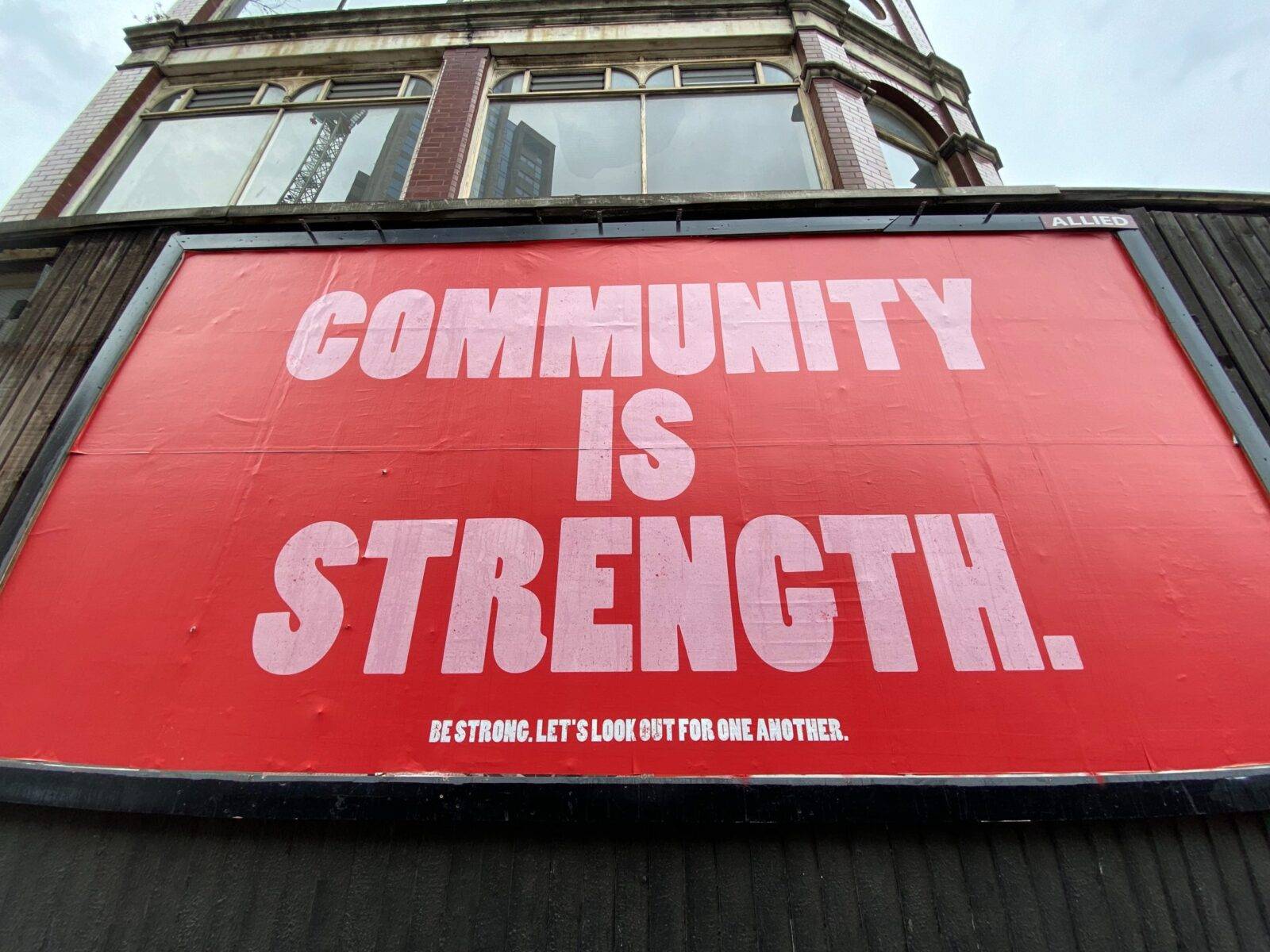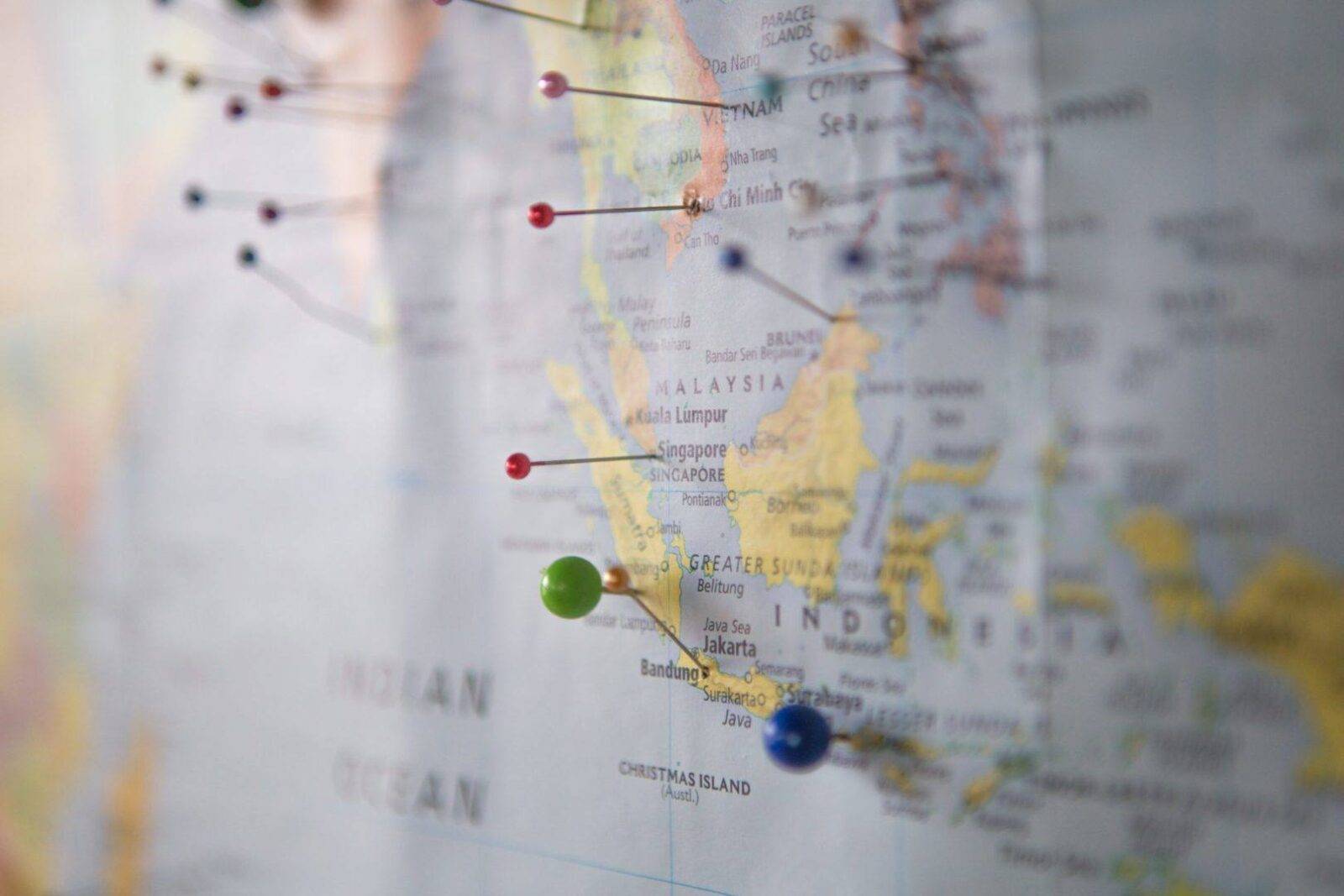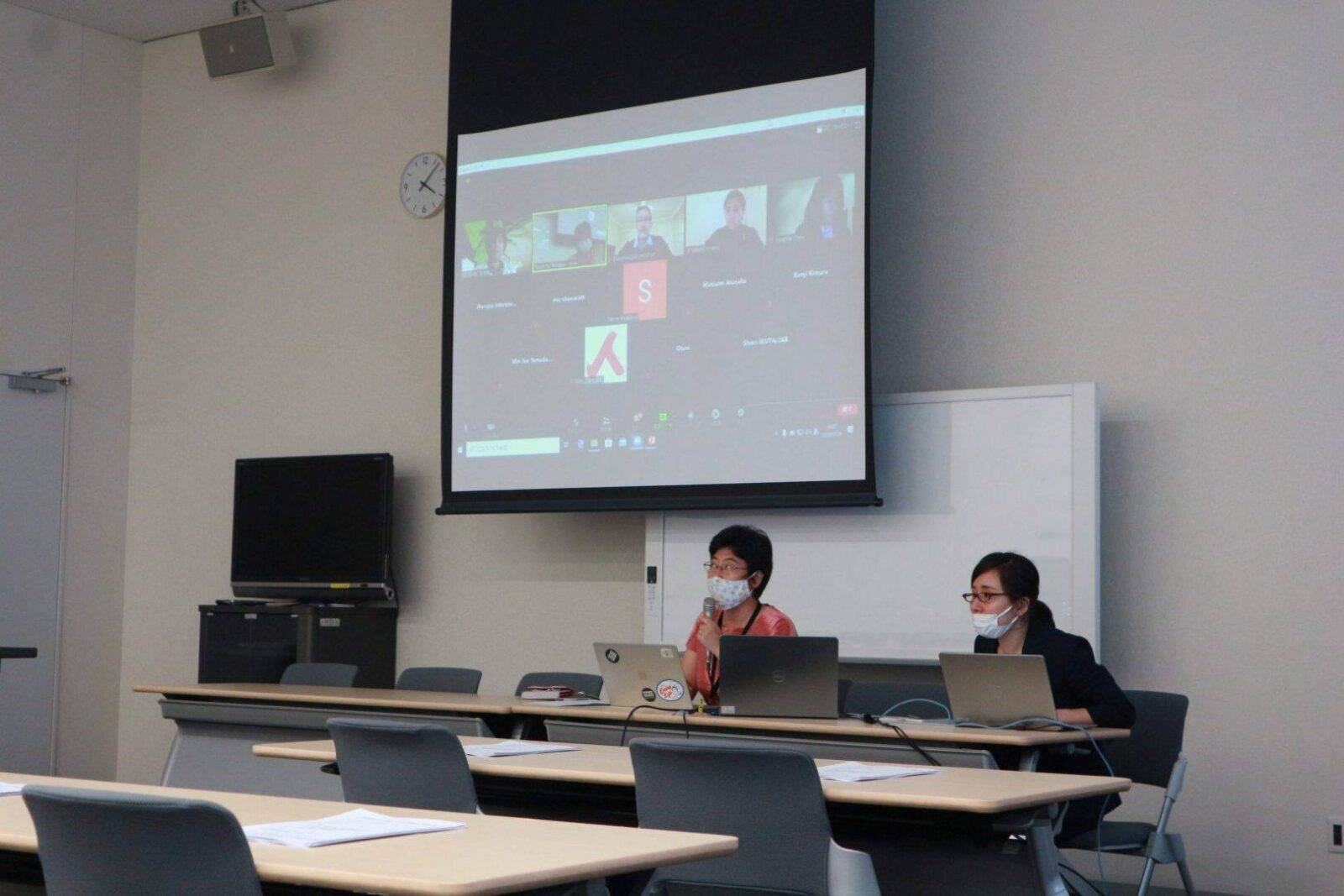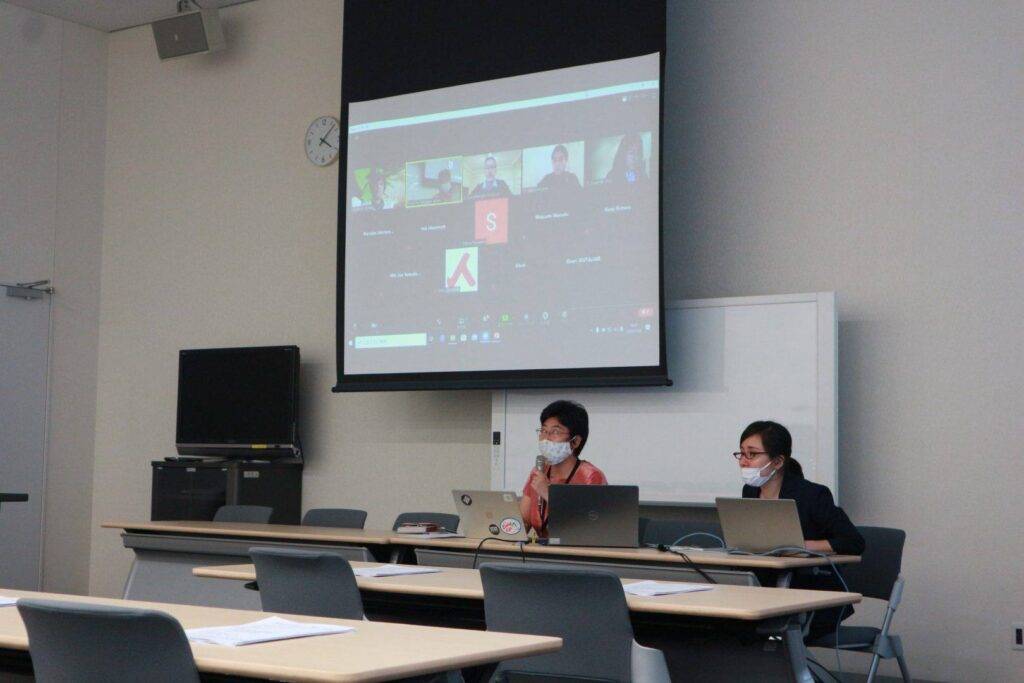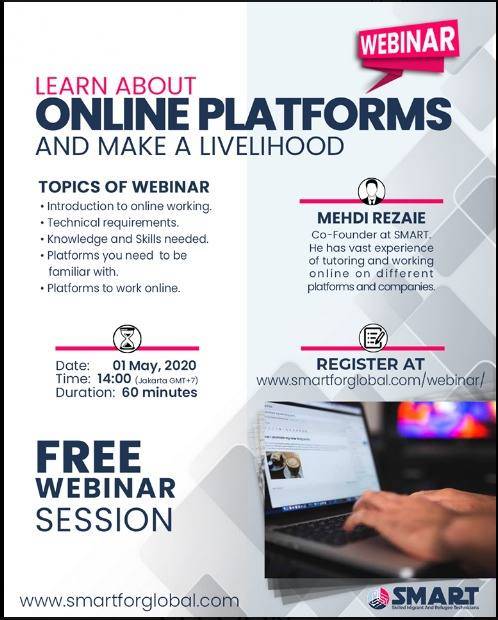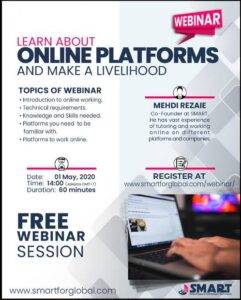Growing Through The Azalea Initiative: Refugee Leadership Programme in Malaysia
In January 2022, the Akar Umbi Development Society, sister organisation of SUKA Society, an IDC member, launched the first series of workshops of the Azalea Initiative. The initiative is a women’s leadership development programme that aims to empower women of marginalised identities and increase their capacities to become changemakers within their communities. The aspiration is for them to become advocates in their own right, and catalyse change towards alternatives to detention (ATD) and an end to immigration detention.
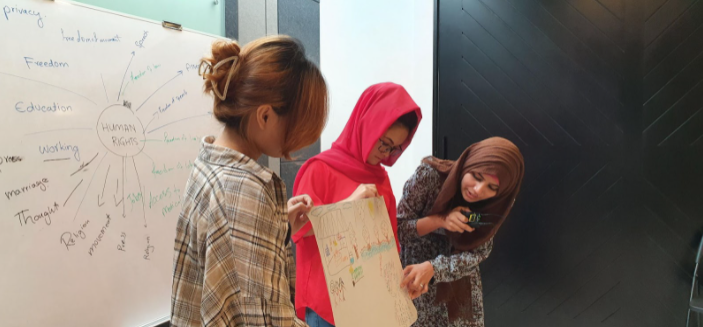
In collaboration with IDC and IDC partners in Malaysia, and with close reference to IDC’s Community Leadership Curriculum, Akar Umbi has developed their pilot programme with modules surrounding themes of migration, identities, power, resilience, justice, solidarity and community organising. IDC’s Community Leadership Curriculum was developed with the goal of supporting the leadership and meaningful participation of people who have experienced or have been at risk of immigration detention. This is grounded in our belief that people with lived experience of detention must be involved in shaping the policies that directly impact their own lives and communities.

The first series of workshops of the Azalea Initiative was joined by 12 participants, who began their journey of learning how to plan, lead and implement projects with Akar Umbi’s support. A participant of the Azalea initiative reflected, "I now feel I can go outside to work if I wanted to. Before this, I felt that I could only stay at home and be a home-maker," demonstrating the significance of an initiative like this in changing lives, even in its initial stages.
For more information on the Azalea Initiative, visit Akar Umbi Development Society’s website and Instagram. For more information about IDC’s Community Leadership Curriculum, please contact IDC Communications & Engagement Coordinator, Mia-lia Boua Kiernan at [email protected]
Written by Hannah Jambunathan Community & Engagement Organiser - Malaysia
Strengthening Community-Based ATD in Thailand
Written by Chawaratt Chawarangkul IDC Southeast Asia Programme Manager
Since July 2021, IDC and HOST International have worked together to strengthen community-based alternatives to immigration detention for children and their families in Thailand through funding from the Canada Fund for Local Initiatives (CFLI). This project aims to shift focus from enforcement-focused models towards ATD that is centered on community-based protection and care for all children and their families, including women heads of households and survivors of sexual and gender-based violence (SGBV).
Currently, IDC and HOST International are working to collate and strengthen the evidence-base for these new ATD models within the Thai context. We will convene the Thai government and civil society networks such as the Coalition for the Rights of Refugees and Stateless Persons to share and discuss our findings, and encourage further coordination on expanding the use of community and rights-based, gender responsive ATD. These new models will provide greater respect for the rights of children and their families released under the ATD MOU.
From August to November 2021, HOST International and IDC commissioned a formal independent evaluation of the HOST Community-based Case Management Pilot Program, which began in December 2018 in response to the release of children and their families from immigration detention under the ATD-MOU of the Thai government. Based on the independent evaluation, we found that the majority of parents and children experienced stress in detention, and felt emotional relief once living in a community setting. They emphasised that they gained confidence in living and moving around the neighborhood without fear of being arrested. It is evident that living outside of detention allows them to reclaim their rights and dignity. For the children who attend school, there has been a very positive impact, and they are supported to integrate into Thai community and culture. Parents, as well as some of the children, have had the opportunity to strengthen life skills through HOST’s activities such as planting vegetables. While there are many benefits, there are also some challenges. For example, the majority of mothers, as well as social workers, have stated that women experience difficulties transitioning from the detention centre to living in a community. During the initial stages, likely due to the ongoing effects of detention, the majority of mothers felt insecure, lacked confidence, and relied on others while caring for their children alone. One of the key recommendations following this program evaluation is that: HOST could establish a support group so that women can help and support one another, particularly those who have recently been released from detention and have settled in the community.
In parallel, we have documented the latest promising practices on community and rights-based, gender responsive ATD models globally; this research has specifically focused on models that could be applied in Thailand to support the Thai government and ATD-MOU implementing partners in better responding to children and their families released from, or at risk of immigration detention. For example, we have identified a range of mechanisms by which governments prohibit the immigration detention of children and their families in law, policy and practice. This includes ensuring that refugee, asylum seeking and migrant children are mainstreamed into national child protection systems, and have the same access to rights as other children in the country, such as education, healthcare and accommodation. There are also important mechanisms to support unaccompanied children, such as the appointment of guardians, family-based care, and appropriate age determination processes. Through our research, we have documented promising examples from a number of countries, including Ireland, Sweden, Italy, UK and the Netherlands. A clear finding from our research has been that there is a gap in gender-responsive approaches and analysis in the development and implementation of community-based ATD. This gap needs to be filled.
IDC and HOST International are now developing ATD Practice Guidelines for the Thai government and NGOs to use in developing and implementing community and rights-based, gender responsive ATD for urban refugees and asylum-seekers in Thailand. Based on the outcomes of these tools, we will convene a workshop in February 2022 to introduce the ATD Practice Guidelines and facilitate a program visit for social workers from the Thai government and key ATD implementing partners in Thailand. Through this, we hope to increase understanding of the practicalities of community and rights based, gender responsive ATD in the Thai urban refugee context and collectively strengthen the ATD policy and practices in Thailand.

Asia Pacific Peer-Learning Workshop: Access to Education
Written by Min Jee Yamada Park IDC Asia Pacific Programme Officer
In September 2021, IDC, together with the Secretariat of the Asia Dialogue on Forced Migration (ADFM), co-convened a Virtual Workshop on Access to Education for refugee and migrant children in Asia Pacific, as part of the Regional Peer Learning Platform and Program of Action on Alternative Care Arrangements for Children in the Context of International Migration in the Asia Pacific.
The Regional Platform continues to bring together government agencies, civil society organisations and international organisations from Thailand, Indonesia, Malaysia, Australia and New Zealand and provides a space for constructive and practical policy discussions related to alternative care arrangements for children in the context of migration in the Asia Pacific.
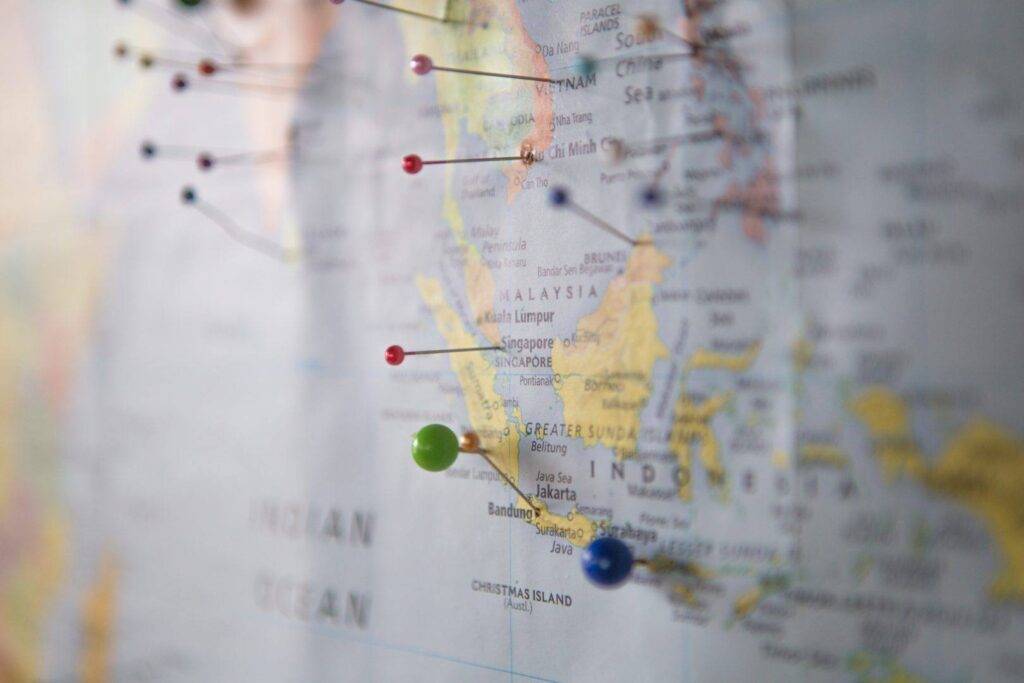
This workshop was the third in a series of online events and focused on the benefits to both society and the individual of allowing access to education for refugee and migrant children. A number of participants were from Education Ministries and local education offices of participating countries and their participation brought a great deal of knowledge and perspectives into this important discussion.
IDC is also very encouraged that as a result of the workshop, some countries have taken steps to continue meeting in their country groups on the issues discussed during the Regional Platform. Some also have expressed interest in working with IDC and ADFM to convene bilateral meetings between participating countries to exchange further learnings on education policy and implementation.
For more information, a high-level meeting summary is also available.
Asia Pacific Virtual Peer-Learning Workshops
Written by Min Jee Yamada Park IDC Asia Pacific Programme Officer & Chawaratt Chawarangkul IDC Southeast Asia Programme Manager
IDC co-convened a Virtual Workshop on Case Management with the Secretariat of the Asia Dialogue on Forced Migration (ADFM) in May, as part of the ongoing Regional Peer-Learning Platform and Program of Learning and Action on Alternative Care Arrangements for Children in the Context of Migration in the Asia Pacific (the Regional Platform). The Regional Platform, which was launched in November 2019, brings together individuals from policy and implementing agencies from the governments of Thailand, Indonesia, Malaysia, Australia, and New Zealand as well as civil society and international organisations, in order to share positive practice and concrete examples of what is working.
Since the launch of the Regional Platform in Bangkok, subsequent meetings have been convened virtually due to travel restrictions resulting from the COVID-19 pandemic. This Virtual Workshop on Case Management is the second in a series of online events, with further virtual events planned for 2021 to support peer learning and facilitate knowledge and resource sharing between the participating countries and partners. For more information on this initiative, please view the meeting summary as well as further materials on case management approaches.

Most recently, on 9 September, IDC and ADFM co-hosted another workshop in this series focused on access to education for refugee and migrant children. This included dialogue regarding the relationship between access to education and successful ATD, drawing on positive practices and learnings from Australia, Indonesia, Malaysia, New Zealand and Thailand. A meeting summary and further materials from this workshop will be available in coming weeks.
Stakeholder Meeting in Bangkok: Thai ATD MOU & National Screening Mechanism
Written by Chawaratt Chawarangkul, IDC Southeast Asia Programme Manager
On 1st December 2020, the Coalition for the Rights of Refugees and Stateless Persons (CRSP) and the Canadian Embassy of Thailand co-organised the CRSP Annual Meeting with Stakeholders at the InterContinental Bangkok hotel. Over 80 people from a diverse group of stakeholders in Thailand, including government agencies, INGOs, UN agencies, and diplomatic missions, came together to more cohesively and confidently map out and articulate their strategic priorities on the Alternatives to Immigration Detention of Children MOU (ATD MOU), as well as the National Screening Mechanism (NSM) for refugees in Thailand.
IDC observed that all stakeholders are willing to advance refugee rights and protections in Thailand, work collaboratively to end immigration detention of children, and share good practices with the international community. IDC captured key statements from critical speakers at the meeting, which could be used to support the work of IDC’s members globally on alternatives to detention.
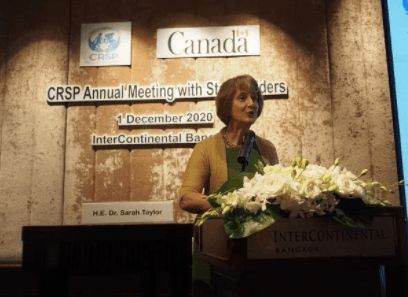
H.E. Dr. Sarah Taylor, Ambassador of Canada to Thailand
"Refugees contribute to the economy, political landscape and create diversity in their new country. Both Thailand and Canada welcomed asylum seekers and refugees. Canada also implements the alternative to detention where detention is considered as a last resort, while Thailand now implements the alternative to the detention of children. This, plus the new screening mechanism, shows signs of progress in Thailand. It is important to work collaboratively among all sectors to protect refugees, and also increase human resources that can contribute significantly to host countries."
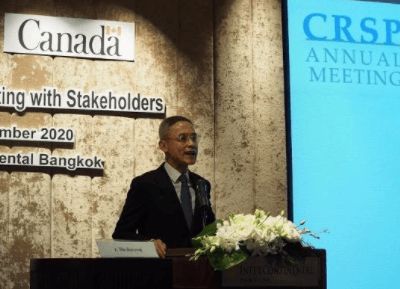
Prof. Emeritus Vitit Muntarbhorn, Faculty of Law Chulalongkorn University; former UN Special Rapporteur, UN Independent Expert, and Member of the UN Commission of Inquiry on Human Rights
"The ATD MOU should be extended to the whole family while the temporary protection should be offered to Rohingya. The NSM should cover all individual refugees. There are three issues for further consideration among stakeholders, including prevention, protection, remediation, coupled with sustainable solutions. Thailand should consider ratifying the Refugee Convention of 1951 and its 1967 protocol with political and social will to work on refugee management."
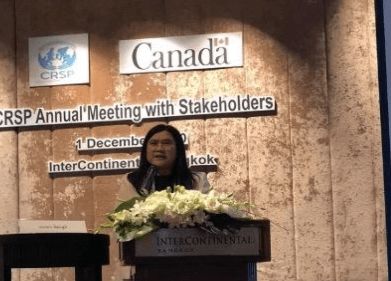
Ms. Kornkanok Wathanabhoom, CRSP Secretariat, Asylum Access Thailand Policy and Communications Coordinator
"Our ultimate goal is for all refugees and stateless persons to receive protection and exercise their human rights under Thailand’s refugee management system, which is fair, transparent, effective, and in compliance with international standards. Through this, we are working closely with all stakeholders to support Thailand to prohibit the immigration detention of all children and their caregivers, in both practice and legislation, with community-based alternatives to detention available for them."
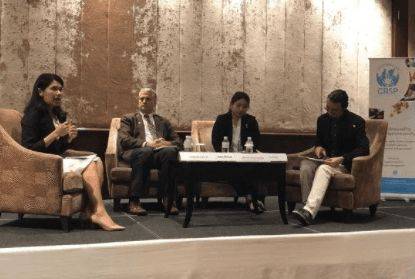
Ms. Thientong Prasanpanich, Director of Protection System Development Division, the Department of Children and Youth, Thailand
"At present, the success of the ATD MOU is on an individual level when it should be more systematic. We believe that working as a network is crucial, and it is also important to discuss human rights protection within the national security framework. The ATD MOU’s goal is never to place any child in detention, and we expected a clear systematic approach where all Ministries involved in the MOU come to work together in the near future."
Since 2013, IDC continues to support our members in Thailand to end immigration detention and promote the rights and dignity of all who migrate. In 2020, we facilitated our members in Thailand to develop their national strategy to end the immigration of children and establish the national screening mechanism in Thailand. This work was the impetus, and provided the foundation for the CRSP Annual Meeting with Stakeholders. We are proud to see CRSP, our strategic partner in Thailand, take ownership of this national strategy and present it to such a diverse group, in order to facilitate and encourage collaboration among key stakeholders.
Roundtable on Mainstreaming Child Protection in Thailand
Written by Min Jee Yamada Park, IDC Asia Pacific Programme Officer
IDC, together with the Asia Dialogue on Forced Migration (ADFM), co-convened a virtual regional roundtable on mainstreaming child protection in the context of international migration. The roundtable was part of a series of ongoing peer learning initiatives under the Regional Platform and Program of Learning on Action on Alternative Care Arrangements for Children, launched in November 2019 at a 2-day meeting in Bangkok.
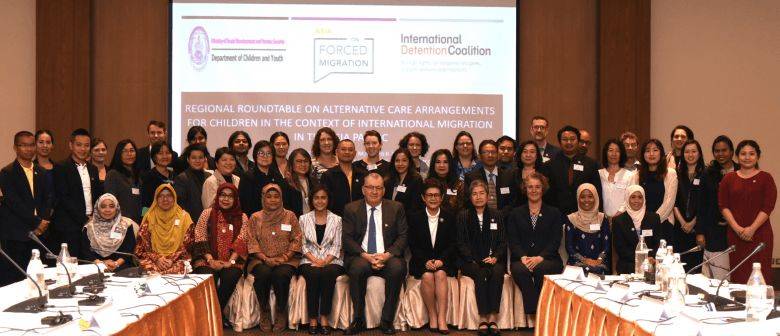
The virtual roundtable was attended by 35 participants from government ministries, civil society organisations and international agencies from Australia, Indonesia, Malaysia, Thailand and New Zealand. Participants provided regional and national level updates including responses to the COVID-19 pandemic. Participants discussed the importance of mainstreaming child protection to ensure more effective and holistic responses to children in the context of international migration, noting the increased protection challenges faced by children during and as a result of the pandemic. Discussions then centered on further areas for peer learning, including case management practices; access to education for refugee and migrant children; and ways in which governments and civil society organisations have partnered in providing alternative care arrangements for children and their families.
A summary of the virtual roundtable, along with agenda and participants list can be found here.
STATEMENT: Malaysia Defies Court Order, Putting Lives in Imminent Danger

International Detention Coalition, the Asia Pacific Refugee Rights Network, Forum Asia and ASEAN Parliamentarians for Human Rights released a joint statement condemning the deportation of 1086 people to Myanmar, and urged the government of Malaysia to guarantee those still in detention access to UNHCR, to release people in need of protection, and to comply with order of the High Court and open an independent investigation.
URGENT STATEMENT
Joint Statement: Malaysia Defies Court Order, Putting Lives in Imminent Danger
BANGKOK, 26 February 2021
The Asia Pacific Refugee Rights Network (APRRN), Asian Forum for Human Rights and Development (FORUM-ASIA), ASEAN Parliamentarians for Human Rights (APHR) and the International Detention Coalition (IDC) strongly urge the Government of Malaysia to grant UNHCR immediate and unfettered access to immigration detention facilities. We further urge the government to investigate the deportation on 23 February 2021 of 1,086 individuals to Myanmar, in defiance of the Kuala Lumpur High Court’s interim stay order granted earlier that day.
On 22 February, Amnesty International Malaysia and Asylum Access Malaysia jointly filed an action in the Kuala Lumpur High Court to prevent the deportation of 1,200 persons to Myanmar. Several hours after the interim halt to deportation order was granted, the Malaysian government handed 1,086 individuals to Myanmar naval ships in flagrant violation of the court order. The next day, the High Court issued an extended stay order against the deportation of the remaining 114 individuals.
The Malaysian government has yet to provide information on the 114 persons or their whereabouts. Immigration officials asserted that the 1,086 deported did not include Rohingya refugees or asylum seekers. However, there is a substantial risk that the group includes refugees and asylum seekers, including unaccompanied children. According to Asylum Access and Amnesty International Malaysia, there were at least three UNHCR card holders and 17 children among those scheduled for deportation. APRRN also received troubling confirmation that at least two of those children was separated from their family and deported back to Myanmar alone.
The risk is also particularly acute given that UNHCR has been denied access to verify and assess individuals fleeing persecution since August 2019. Malaysia also lacks a domestic policy and legal framework for the identification and recognition of refugees in the country. In November 2020, the Human Rights Commission of Malaysia (SUHAKAM) estimated that there were approximately 1,000 refugees and people seeking asylum still in detention. The Ministry of Home Affairs confirmed that as of 26 October 2020, more than 756 minors are in immigration detention, with over 326 unaccompanied or separated children from Myanmar.
Returning individuals in need of international protection to Myanmar, especially children rendered unaccompanied through forcible separation from their parents or guardians, would amount to serious violation of Malaysia's Child Act and Malaysia's international obligations, notably the Convention on the Rights of the Child and the principle of non-refoulement.
Since the forceful seizure of power by the Myanmar military on 1 February 2021, Myanmar has seen the largest protest and uprising, calling for the restoration of democracy. Grave human rights abuses and tension have also risen steadily with hundreds of arbitrary arrests and detentions, deliberate internet disruption and disconnection from the outside world. With the escalating concerns over the rapid deterioration amidst a health crisis, “the use of deadly violence” by the military on innocent civilians, including the recent killing of a 14-year old was heavily condemned by the United Nations Secretary General in the 46th UN Human Rights Council session. World leaders, including G7 countries and neighbouring members of the Association of Southeast Asia Nations (ASEAN) continue expressing deep concern about the ongoing repression, horrifying loss of lives and the developments that would lead to serious regional instability. Malaysia was amongst the ASEAN countries which echoed that the political turmoil in Myanmar may affect security and stability in the region and is “one step backward in the process of democracy in that country”.
Ethnic minorities, many exiled in Malaysia, including amongst the 1,086 deported, have suffered atrocities for decades under the rule of the military. There is great fear that life for these ethnic minorities deported back to a military regime will likely worsen. Given the increasing instability and drastic shift in the political landscape in Myanmar, individuals who were previously not exposed to protection risks might now face severe security and safety threats.
We therefore call upon the Malaysian government to:
- Urgently grant UNHCR immediate and unrestricted access to the 114 individuals and all immigration detention facilities to verify the status of all detainees;
- Release individuals in need of international protection as identified by UNHCR who are still in detention, especially amongst the 114 who remained;
- Comply with the extended stay order issued by the Kuala Lumpur High Court on 24 February against the deportation of the remaining 114 who were part of the original 1,200 to be deported; and
- Open an independent and thorough investigation into the breach by the immigration department of the court order on 23 February, ensuring that those acting in violation of the court order are held fully accountable.
- END –
The Asia Pacific Refugee Rights Network (APRRN) is a network of 451 civil society organisations and individuals from 28 countries committed to advancing the rights of refugees in the Asia Pacific region. APRRN aims to advance the rights of refugees and other people in need of protection through joint advocacy, capacity strengthening, resource sharing and outreach. While APRRN statements are prepared in consultation with members, they do not necessarily reflect the views of all APRRN members. www.aprrn.org
The ASEAN Parliamentarians for Human Rights (APHR) is a regional network of current and former parliamentarians who use their unique positions to advance human rights and democracy in Southeast Asia. www.aseanmp.org
The Asian Forum for Human Rights and Development (FORUM-ASIA) is a Bangkok-based regional network of 81 member organisations across 21 Asian countries, with consultative status with the United Nations Economic and Social Council, and consultative relationship with the ASEAN Intergovernmental Commission on Human Rights. Founded in 1991, FORUM-ASIA works to strengthen movements for human rights and sustainable development through research, advocacy, capacity-development and solidarity actions in Asia and beyond. It has sub-regional offices in Geneva, Jakarta, and Kathmandu. www.forum-asia.org
The International Detention Coalition (IDC) is a powerful global network of 400+ organisations, groups, individuals, as well as representatives of communities impacted by immigration detention, based in over 100 countries. IDC members have a wide range of specialisations related to immigration detention and alternatives to detention, including academia, law, research, policy, direct service, advocacy, and community organising. IDC advocates to secure the human rights of people impacted by and at-risk of immigration detention. In partnership with civil society, UN agencies, and multiple levels of government, we strategically build movements, and influence law, policy and practices to reduce immigration detention and implement rights-based alternatives to detention. www.idcoalition.org
Media Contacts
Asia Pacific Refugee Right Network
Themba Lewis, Secretary General
Email: [email protected]
ASEAN Parliamentarians for Human Rights (APHR)
Email: [email protected]
Asian Forum for Human Rights and Development (FORUM-ASIA)
East-Asia and ASEAN Advocacy Programme
Email: [email protected]
International Detention Coalition
Carolina Gottardo, Executive Director
Email: [email protected]
Thai & Malaysian Networks Refine Strategies to End Child Immigration Detention
IDC has supported national coalitions in Thailand (the Coalition for the Rights of Refugees and Stateless Persons - CRSP), and Malaysia (the End Child Detention Network - ECDN) to come together to revisit their respective Theories of Change (TOC) and national strategies to end child immigration detention developed in 2018.
These shared visions and cohesive strategies have guided civil society in Thailand and Malaysia to work on advocating for changes in immigration policies in the past two years; for example, the Thai Memorandum of Understanding on the Determination of Measures and Approaches Alternative to Detention of Children in Immigration Detention Centers and the National Screening Mechanism for refugees.
To support members in revisiting and updating their ToC and national strategies to reflect the significant changes that have taken place at the national, regional and global levels, IDC convened a national strategy workshop for the CRSP network on 24 and 25 September, and for ECDN on 1 October.
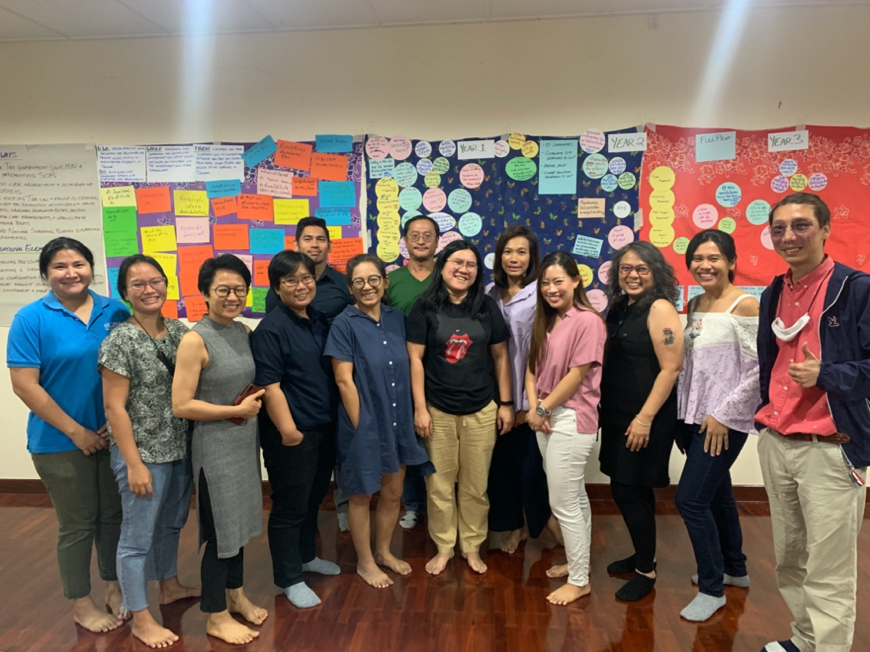
Through these national strategy meetings, participants came together to take stock of their achievements from the past two years. In Thailand, CRSP updated their 2018 ToC and national strategy, and developed their annual workplan along with a monitoring mechanism to ensure the strategy's effective implementation. They also agreed upon how they will coordinate to achieve their goals together. CRSP aims that by 2023 Thailand will prohibit the immigration detention of all children and their caregivers in both practice and law, while at the same time ensuring that community-based alternatives to detention are available for them. Through this common vision, the Thai network will work with all national and international stakeholders to support the government to achieve the necessary changes in perceptions, practices, and legislation towards human-rights and child-rights based ATD. They will also strengthen a holistic case management system and pilot a community-based ATD system that the government allocates resources to the system.
In Malaysia, participants had the opportunity to onboard new network members, and discuss new goals for the network. Following the meeting, a working committee of ECDN members have continued to convene to develop a workplan along with a monitoring mechanism.
For several years now, the IDC has seen our members and partners in Malaysia and Thailand engaged in advocacy and service provision for children impacted by immigration detention. With support from IDC, network members in both countries have become increasingly confident in advocating for ATD. These new, updated strategies will support them in prioritising and coordinating efforts towards the ultimate goal of ending the immigration detention of children and their families in both countries.
Advocacy for Rights-Based ATD in Japan
On 28th July 2020, Forum for Refugees Japan (FRJ), an IDC member and a network of NGOs working to support asylum seekers and refugees arriving in Japan, hosted a webinar on Alternatives to Detention (ATD) to raise awareness among members of parliament in Japan.
The webinar was attended by eleven MPs and their staff members from both ruling and opposition parties. Vivienne Chew from IDC’s Asia Pacific Programme was invited to speak on global trends on immigration detention, international research findings on ATDs as well as the lessons learnt from various ATD models. David Keegan from HOST International, an IDC member based in Australia, also had an opportunity to share the asylum system and ATD measures currently in place in Australia with Japanese MPs and civil society members.
The webinar was organised against the backdrop of the recent report submitted to the Ministry of Justice in Japan by Expert Panel for Detention and Deportation in July 2020, in which the panel suggested measures to address the long-term detention of foreign nationals including asylum seekers, in Japan. Civil society has raised concerns over the panel’s suggestions, in particular, proposed measures that could result in criminal penalties being applied towards migrants and failed asylum seekers who are unable to follow deportation orders. On a more positive note, the report mentioned ATD as a potential means to resolve long-term detention, though the term “ATD” is largely undefined. Following the release of the report, FRJ members immediately released a joint statement (English translation here) on the recommendations made by the Expert Panel and subsequently organised the ATD webinar.
The webinar came in timely as the Ministry of Justice will be using the expert panel report for the revision of the Immigration Control and Refugee Recognition Act during the next parliamentary session due to take place in a few months. The webinar provided an opportunity for FRJ to highlight the importance and effectiveness of rights-based, engagement centered ATD rather than models based on enforcement and sanctions. The vital role of collaboration between government and civil society actors in ATD implementation was also discussed.
Moving forward, FRJ and its members will continue to engage with relevant government agencies to ensure the future ATD scheme can contribute to a rights-based asylum and migration governance system in Japan.
New Education Initiative By Refugee-Led Startup
JRS Indonesia, one of the most active IDC members in Asia Pacific, has launched a new initiative recently to support education and livelihood of refugees in Indonesia. Through a partnership with a refugee-led IT startup initiative, SMART(Skilled Migrants And Refugee Technicians), JRS Indonesia has supported SMART to host a free webinar for refugees on making a livelihood online. This project is particularly relevant and timely in the context of Covid-19, as livelihood options for refugees have become ever scarcer.
SMART and JRS are also exploring the possibility of developing a livelihood capacity building programme for refugees, providing Covid-19 related information online and creating an e-study platform in partnership with a community-based learning centre for refugee children. This platform will allow teachers to conduct their classes online and will help refugee children to continue their education despite the restrained movements due to Covid-19.
For more information, please directly contact:
Mr Gading Gumilang Putra (Jesuit Refugee Service Indonesia) at [email protected]
